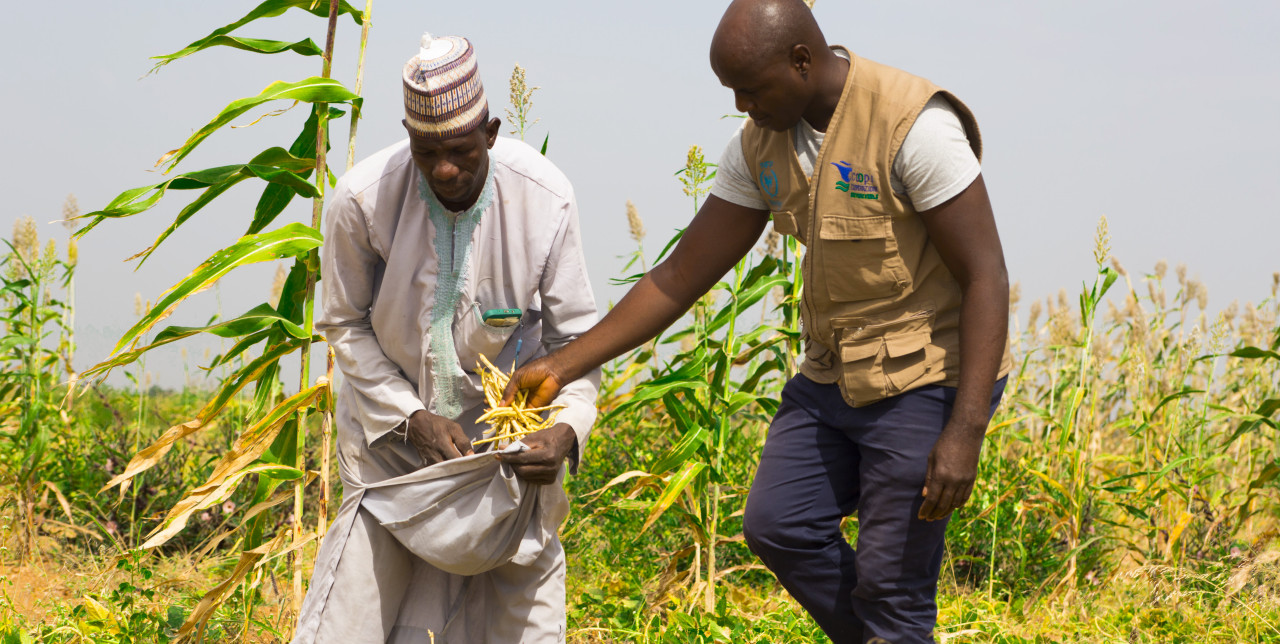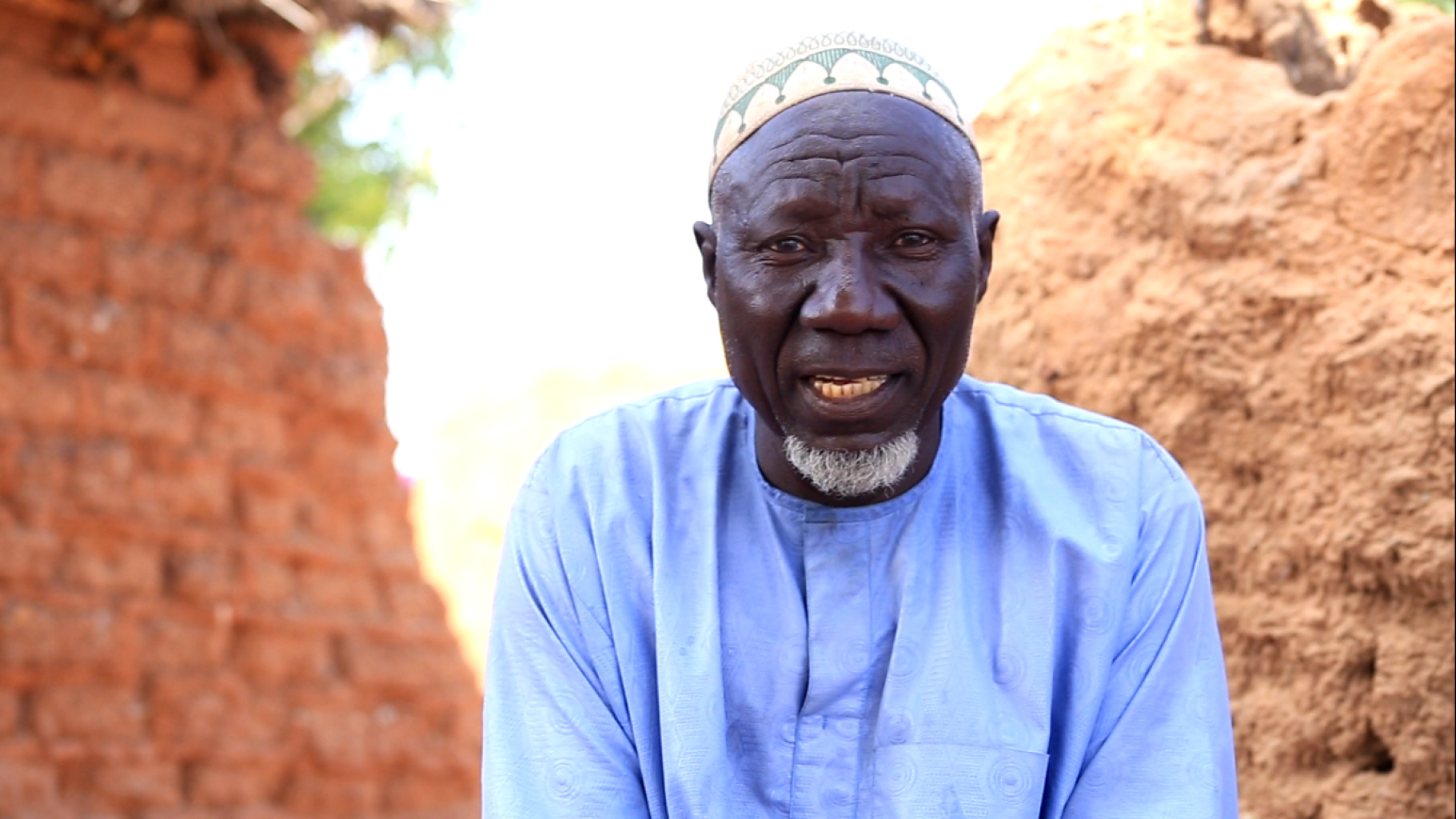22-12-2023 | di COOPI
Nigeria. Fleeing terrorists, but saved from hunger and despair
After the terrorist-driven clashes that affected their villages Alhassan Usaini, Bintu Usma, Garba Goni and Moustafa Modu, lost everything. With no longer a home to stay and with the distress caused by the violence they suffered, they were displaced in search of a new place to start over. Thanks to support from The World Food Programme and COOPI – Cooperazione Internazionale, they were able to start a new life.
"The darkest period of our lives"
The risk - with no more income or livelihood - was that they and their families would go starving. Alhassan, a returning migrant from Kasaisa, Yobe State, knows this well, telling:
At the beginning, honestly, we were suffering a lot, we could not sleep peacefully knowing that we had no food to eat. We were experiencing hardship and lack of financial resources, with little or no hope of being able to farm. We will certainly not soon forget that period, the darkest period of our lives".
An equally poignant telling is that of Bintu, a 29-year-old young mother who, due to Boko Haram attacks, found herself, alone, fleeing Madinari, in northern Nigeria.
Before the crisis, I was involved in small businesses in my community and was engaged in poultry farming.” She tells. “Life, for me and my children, used to be peaceful, but since we lost everything during the insurgent attack, it has become difficult. We were forced to flee our home and the conditions we were in were terrible. This combined with the fact that my husband passed away.... They took us away everything we had, making life so difficult for us!"
A humble work to provide for their own families
Terrorist attacks on Gujba, Geidam, and Damaturu’s communities, on the border between Borno and Yobe states in northern Nigeria were intense and relentless in 2022 and 2023. So much so that they forced most of the residents to flee to a relatively safe place such as the IDP camps. Their main concern was the lack of food, especially for women and children, and to cope with this everyone did what they could as best as they could. In the early days after his family's relocation, Garba, a family man, often went into the bush in search of wood or sold water within the community to gather the little resources he needed that would allow him to take care of his wife and children.
This has been our coping mechanism since we were forcibly displaced." He told us.
As in the case of Moustafa, with the expectations of earning a small income to invest for minimum necessary expenses, the displaced people often engage themselves in menial jobs. For example, he was engaged in cash-for-work activities in the neighboring community during the rainy season, i.e. small paid activities that included clearing brush in forested areas, tilling dry soils, and harvesting at local farms.
Thanks to the World Food Program, however, I experienced a life-changing transformation from being a mere laborer to owning my own business and even creating work for others. Now I am a role model in my community and I am grateful for how the intervention has transformed my life,"
says Mustafa, who after participating in trainings organized as part of the project and starting his own business, also made himself available to teach other people in his community how to formulate local fertilizers.
A new home or a new job
For some beneficiaries, the support consisted into small financial contributions so that their reduced available funds could be directed to a variety of needs in addition to the purchase of food, also enabling them to meet a minimum standard in their living conditions. This is the case, for example, of Garba, who tells:
There 'was issued a card of 17,500 naira per month (n.d.: the local Nigerian currency) and at that moment our life took on a new dimension. I started to make progress with the support of the few resources I was earning from some jobs I was doing, so I was able to start saving and buy a land to build my house. I currently live in my building, I haven't finished building it yet but I was able to complete the roofing of a room where my family currently lives".
A similar story is that of Alhassan Usaini, who used the financial contribution to pay the workers who support him in his daily work and to buy necessities for his family.
Thanks to training on best agricultural practices from WFP and COOPI, I was able to grow enough products to support my family for the next year." He says.
A small contribution for a new beginning
After going through that traumatic experience of displacement a short while ago, I was happy and hopeful when COOPI registered me for the World Food Program - funded livelihood and resilience-building intervention. Inside I really felt a great relief. I was given eight hens and two roosters, as well as a 25 kg bag of poultry feed. I was also taught how to identify the symptoms of the chickens’ diseases and take care of them. None of this would have been possible without their intervention, so I sincerely thank the World Food Program and COOPI!"
Explains Bintu, whose life has completely changed because of the way she invested the contribution given to her. With the knowledge she gained, she was able to grow and sell six chickens, and with what she earned she bought a goat. She is now able to start her own business.
Like her, Mustapha, who after receiving the same grant and training from COOPI on good agricultural practices and how to plant seeds, started saving to invest in the farming business to grow beans and sorghum.
COOPI has been operating in Nigeria since 2014 and through three offices and a widespread presence on the ground, it provides multi-sectoral humanitarian assistance in crises, to strengthen the resilience of vulnerable populations, especially in the Country's northern states.
In the gallery Alhassan and his family in the fields with a COOPI worker (first five photos), Bintu with her goat and a COOPI worker (next four photos), Garba and his family (next two photos), and Moustafa with his workers and a COOPI worker at work (next four photos).
Author: Kennedy Jonathan




 Nigeria
Nigeria
